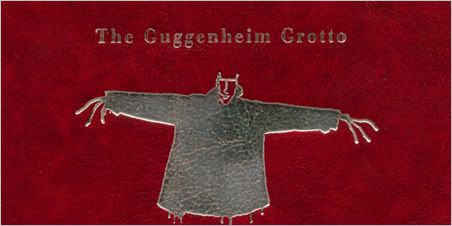
“Told You So“
from the album …Waltzing Alone
2005
iTunes
Hailing from the same Dublin songwriting scene as Damien Rice, Irish trio the Guggenheim Grotto might not be as well-known within the U.S., but that’s beginning to change. Syndicated taste-shapers like Morning Becomes Eclectic‘s Nic Harcourt (KCRW) and The World Café‘s David Dye (WXPN), among others, have taken notice of the group’s musical artistry, and deservedly so, given the exquisitely crafted folk-pop of their LP debut, …Waltzing Alone.
With gorgeous, honey-dipped vocal harmonies illuminating the way, the band’s melodic sophistication asserts itself with economy, marked by spare arrangements that help their songs resonate with rich intimacy.
A beautiful clarity pervades throughout, in part because nothing ever feels heavy-handed. The trio works with a masterfully light touch, from their delicate acoustic fingerpicking to the effortless harmonies to the instrumental arrangements, giving each song the perfect weight and density for its intentions. Beyond acoustic guitar, the band incorporates other stringed instruments with expressive timbres — double bass, cello, viola — that, together with keyboard tones of piano, Hammond, Wurlitzer, and Rhodes, create a cinematic palette with which to underscore a mood. Soft atmospheric strokes suggest rather than saturate, while the band members’ multi-instrumental abilities help each tune find its own distinctive identity.
In the album’s liner notes — notable for sharing the band’’s insights about the development of the songs — members Kevin May, Mick Lynch, and Shane Power reveal a few of the eclectic influences that infiltrated the record: Marvin Gaye, Leonard Cohen, a Shelley poem, and David Crosby’s spare production on Joni Mitchell’s debut album, Song to a Seagull. Far from wearing their influences literally, though, they use them as sparks of inspiration that give form to their own artistic ideas. On “Koan,” the group extracts a phrase from an online interview with Cohen, in which he relays a nugget of advice given by his spiritual guru Roshi (“You should sing more sad”). The line becomes a refrain in the song, a beautiful vocal harmony arranged with cello, glockenspiel, and viola. Likewise, on “Vertigo,” the trio borrows the percussive vibe of Gaye’s “Inner City Blues,” but the languorous, descending progression travels lyrically to a different place. “Ozymandias” is haunting folk ballad that draws both from the Shelley poem and a story by fantasy author Neil Gaiman.
On “Portmarnock Beach Boy Blue,” chanting vocals suggest an almost druid-like incantation before the pre-dawn mood yields to sunny harmonies. The pedal steel-inflected “I Think I Love You” revels in the delirious excitement of blossoming romance. “A Lifetime in Heat” brings together minimalist touches of piano, double bass, and guitar parts, while a viola sings a shapely melancholy line. “Philosophia” suggests Simon & Garfunkel in a hypnotic trance.
You, too, might find yourself hypnotized by the lyricism of this record.


